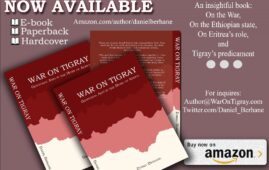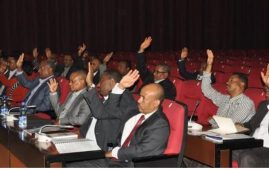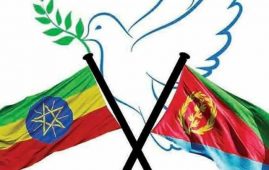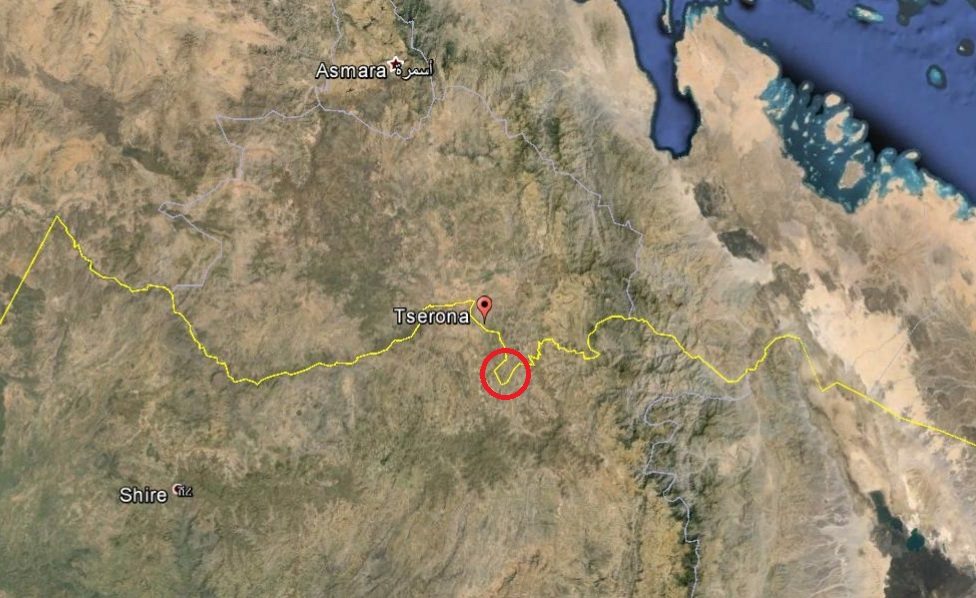By Nahusenay Belay
The Horn of Africa in general and Ethiopia in particular are on the rise. The peace accord reached by the Sudan and the Republic of South Sudan the ability of Somalia to go beyond the pessimist expectations, the impressive economic achievement in Ethiopia and its promise of socio-economic transformation, the peaceful and historic intra-party power succession in Ethiopia, the decision of Ethiopia, Kenya and South Sudan to develop a regional development corridor, and the security cooperation signed between Ethiopia and Republic of Sudan are fundamental to the future of the Horn of Africa. With this optimism in mind, let us examine some growing concerns of peace and security in the Horn, with special emphasis on Ethiopia and its main strategic security concerns.
Of all strategic challenges in Ethiopia, the Eritrean government stands first. After many years of political deadlock and unhealthy relations, there is currently an initiative, led by South Sudan, to mediate Ethiopia and Eritrea in some form of shuttle diplomacy. This news has to be welcomed warmly: a newly created post-conflict state taking initiative to mediate two conflicting parties is a success by itself and somehow shows the peaceful and loving nature of the state of South Sudan. Of course, more than any other country, South Sudan knows the price of war and conflict. However, given the erratic behavior of the Eritrean regime, the Ethiopian government must be careful with this proposed mediation. Due to the changes in foreign policies of Ethiopia against Eritrea, international pressure on President Isaias Afewerki, internal alienation of the regime from its citizens and from the ‘international community,’ negotiated settlement might be said to be the best option for the survival of the Eritrean regime. However, I am claiming here that due to its very nature, the Eritrean government will remain a strategic challenge to Ethiopia’s peace and development, and the proposed mediation might help to prolong the life span of the Eritrean regime. Thus, if the proposed mediation is going to prolong Isaias’s stay in power, are we not by implication extending the life span of our main strategic challenge?
Isaias is ready to cooperate with anyone who wants to destabilize Ethiopia, be it an Ethiopian opposition, the Sudan, Egypt or any form of militant group. We are witnessing a concerted effort by some diaspora oppositions (both the self-proclaimed forces of ‘Unity’ and Separatists like Ogaden National Liberation Front (ONLF) and Oromo Liberation Front (OLF)) together with the Eritrean regime (a regime determined to see a disintegrated Ethiopia). The danger is that a majority of the Ethiopian opposition is not able to differentiate the fundamental interest of the state and the interests of the current Ethiopian government. ‘There is no permanent friend and permanent enemy, but permanent interests, and strategically speaking, the Eritrean government, due to its comprador character, will always stand against our strategic interest.
What does Isaias (bear in mind that Egyptian and Sudanese interests are embedded here), Ginbot 7, ONLF, OLF, and their local operators (some opposition parties and ‘civil society’ organizations and Salafists supported by Saudi and Qatari money and propaganda) and supporters (conscious actors and misguided participants) have in common? What is the nature of their alliance? Is it not the
shortsighted nature of their objectives that is uniting them? This alliance is determined to use any available instrument to realize its objective, including religious establishments and ‘protests’ aimed at the current ruling party and the very nature of the Ethiopian state. However, the point is that the Ethiopian Peoples’ Revolutionary Democratic Front (EPRDF) and its government is not an eternal entity. It is logical and obvious that EPRDF cannot live forever, but states and their community stay long (not forever). So, things should be seen in strategic terms, whether EPRDF is in power or not, as far as there is a country called Ethiopia, strategic understanding must be at the center.
With full acknowledgment of the Eritrean independence and sovereign existence, it is important to rethink our positions towards the regime in Asmara. Since the shift of Ethiopian foreign policy towards Eritrea, it is substantially difficult to argue that the Eritrean government is changing its project of destabilization. It must be remembered that it is after Ethiopia declared this shift in its foreign policy that the Eritrean government and forces supported by it, began conducting abductions and the killings and hostage takings of tourists. I am claiming that the regime in Asmara cannot stop destabilizing for the simple reason that destabilizing Ethiopia is its main source of survival. The current Ethiopian leadership should understand the magnitude of the threat Eritrea is posing to our security and we should not spend time in tit-for-tat measures. Therefore, the proposed/said mediations may help the Eritrean government’s survival strategy by giving an optimist impression of peaceful settlements of dispute.
In related terms, we have learned that the Eritrean government is arming every male who above 15 years of age with an official message to ‘defend’ their country and their people. This unexpected move may be a sign of many developments and should serve as a point of analysis. Let me pose a simple question: what is the motive behind this militarization of an already over militarized state and society? Can this move give us hindsight about the actual situation of the Eritrean military and political landscape? Could this be a source of concern for the peace and stability of the Horn in general and Ethiopia in particular?
Let me start by analyzing the probable motives of this mass
militarization. In this regard, I will argue that there are two fundamentally interrelated probable motives. The first reason may be the need to securitize the socio-economic and political demands that are growing in time inside Eritrea. By making security the primary concern of the state, the regime wants to extend its life via the continuous fabrication of security concerns and popular confusion. Its inability to give proper answers to the legitimate demand of the Eritrean mass is the primary motive to resort to politics of securitization and mass confusion, which are sustained by persistent TV and radio propaganda. The coming of this measure in the
‘Post-Meles’ era may render a realist dimension to the fear of invasion from Ethiopia. But, knowing the overall orientation of EPRDF and its past history does not support this perspective. Of course, the re-orientation of the Ethiopian government in its foreign policy towards Eritrea does not relegate the possibility of changing the regime in Asmara as a last alternative, but this shift occurred while the late Meles Zenawi was still the Prime Minister of Ethiopia. The second probable reason may be the fear of a possible coup d’état. By arming the whole population, the ‘civilian’ office of the president is decreasing the monopoly of violence in the regular army. This might be true if we carefully see the number of defections happening in the regular Eritrean army. The absence of trust in the military might be the motive to arm the population in order to make sure that there is no unified center of military power that could attempt a coup d’état. The fundamental similarity between the two motives is that their main objective is to preserve the power of Isaias and his clique.
This move might show the nihilist tendency and the suicidal character of a regime in the verge of disintegration. It is the behavior of regimes that have lost trust in their own coercive apparatus. The implications of militarizing the mass are wider, especially in the Horn of Africa where conflicts over resource and identity easily affect characters and consume the life of many people. The wide availability of warfare instruments changes the trend of conflicts and narrows down the possibilities of peaceful resolutions of conflict. Moreover, the social unrest and possible criminal activities may be widespread. In general, the militarization of the Eritrean mass is a setback to the peace and security of the Horn. The abundant
availability of armament is one of the biggest challenges in stabilizing Somalia, and this history may just be repeated in ‘post Isaias’ Eritrea. Disarmament is a challenging task once the guns become part of social existence, or in some cases a means of livelihood.
Elimination of Isaias’s regime must be our primary goal insofar as this regime is using every second to contemplate Ethiopia’s
destruction. The information from Wiki leaks about the intension of Egypt to use military force against Ethiopia and the capacity of Sudan to produce sophisticated armaments with the probable collaboration of Iran and Egypt is also another concern for our national security. The relationship between Egypt and Ethiopia has always been full of suspicion and conspiracy. A poor and divided Ethiopia is the dream of Egypt and to some extent the Sudan. Egypt is doing whatever it can to destabilize and weaken Ethiopia. So the only remedy is the removal of the regime in Asmara. For Isaias, forming an alliance with countries that seek to destabilize Ethiopia is the main strategy of his survival and source of major aid from Egypt and others. If elimination is impossible, at least the Ethiopian government must make sure that it will no longer present a formidable threat to our security. It is known that removing Isaias will not be an easy and cheap task but we have to do it, otherwise we will pay the price everyday, and its cumulative effect may be unbearable. This is also the core essence of the shift in Ethiopian foreign policy towards Eritrea.
With regard to ‘armed groups’ who are trying to make us believe that they are fighting for the benefit of Ethiopia while making alliances with Ethiopia’s number one enemy, must know that their credibility and independence from Isaias is completely questionable. The Eritrean government is using them as executioners of Isaias’s dream of disintegrated Ethiopia. At the same time, the Ethiopian government must be willing to settle problems in a civilized manner with any organization. This act will be of much significance. First, it will narrow the gap that is helping our strategic enemies. Moreover, it will develop our culture of solving problems peacefully, and finally, it will provide Ethiopia with the chance to contribute their share in solving our pressing issues. Here, the opposition forces need to differentiate between short-term power objectives and long-term strategic interests of the country. They have to pay the price of upholding principled and considerate objectives. It is expected that such decisions will offend their fanatic diaspora basis that see no option of negotiation and compromise. They are even forcing genuinely established organizations towards extremism, which breads hate, prejudice and exclusiveness. Removal of the Isaias regime will limit the chances of resorting to armed struggle. In other words, this act will abolish the chances for subversive and unconstitutional forms of politics. We have paid enough throughout our history and this trend must stop somewhere, by eliminating, or at least incapacitating the Eritrean regime, we can move a step closer to drying the chances of violent politics.
The diaspora can be a very important force, both economically and politically. A majority of them has the capital and some of them are endowed with important knowledge and experience. The Senegalese and Ghanaian experience is very illustrative. However, due to the influence of business-minded fanatic ‘activists’ and poor or absent strategy of the government, the role of the diaspora in Ethiopia is very low, if existent.. It is paradoxical to observe higher degrees of intolerance and inability to discuss democratically in the diaspora community while living in relatively democratic and peaceful environments. The theory of environmental determinism does not seem to work with Ethiopians in the diaspora. This diaspora fanatical political behavior is also contaminating our local debates. Fanaticism and totalitarian thinking is becoming a defining character of our daily interactions. The social media sites like Facebook and Twitter are not only venues for mobilization and information sharing but are also abolishing the distance between the local populace and the diaspora. At the same time though, policy makers should consider the demand of the diaspora. They could be Ambassadors of their country and investors like the Chinese and the Indians. Why not our own diaspora?
Some commentators, while agreeing on the magnitude of the threat, may argue that Ethiopia’s decision to remove Isaias may help him to mobilize the already disfranchised Eritrean mass. The other concern may be the cost of invasion. There is no free lunch! The choice is simple: choice number one is paying everyday – the taking of hundreds of hostages, the killing of civilians, harboring destabilizing forces, attacking our flourishing tourism sector, leaving people living on the border in constant fear, the bombing of schools and public transports, the looting of border markets, setting houses on fire and more; and choice number two- the strategic measure of getting rid of the main problems once and for all in strategic terms. There is also the notion of pride, a big country shall not cry by the madness of a tiny, poor and fragile state. Actually, it should not be an expensive enterprise as the Eritrean regime is a government on the verge of collapsing .
Generally, the erratic and destabilizing nature of the Eritrean government minimizes the success of would-be mediations. Additionally, the continuous destabilizing character of the Eritrean government, even after the shift of Ethiopia’s foreign policy, raises questions about the real effects of the policy shift. Moreover, the Eritrean government’s survival strategy is dependent on its major areas of engagement i.e. destabilizing Ethiopia. The unholy alliance between different local and foreign forces in this project of destabilizing and disintegrating Ethiopia must be curbed timely. Development in unsecure environments will have its own costs. Therefore, the Ethiopian government should make the cost benefit analysis and get rid of the bad boy or at least incapacitate its terrorizing structure!
Ed’s Note: The writer is a lecturer at Addis Ababa University, Center for Federal Studies and a guest researcher at the University of Fribourg, Switzerland. The views expressed in this article do not necessarily reflect the views of The Reporter. He can be reached at [email protected].
************
Originally published on the ReporterEthiopia.com on Dec. 15, 2012.






SUPER SUPER ቆይ ቁምነገር ለምን አትጽፍም ኢትዮጵያን መውደድ እኮ በኢትዮጵያዊ ጨዋነትም ይገለጣል!
ERITREA PRSIDENT PLANS TO FLEE ERITREA BEFORE AN INEVITABLE SEX SCANDEL. Go To isayasafwerki.webstarts.com
ERITREA PRESIDENT ASS-FUCK ISSAYAS AFWERKI
NOTE IN ADVANCE, IF CONFRONTED, FILTHY-MOUTH PRESIDENT ISAYAS WILL DENY THIS FACTS FOR ‘ ERITREAN OPPOSITION LOCALLY OR OVERSEAS TRYING TO TAKE HIM DOWN’ – ALL ISAYAS HAS IS A TONGUE AND A TORN ASS. WHAT A FAGGOT WHORE? CHECK HIS RECTUM, IT WILL SPEAK FOR ITSELF.
INSIDE FACTS ABOUT ERITREA PRESIDNET BONNY-ASS FAGGOT-WHORE ISAYAS AFWERKI: FAGGOT-WHORE, BRIDE-MAID, BONNY-ASS, FLITHY-BREATH ERITREA PRESIDENT ISAYAS AFWERKI IS AN FAGGOT SEX SLAVE WHORE AND HIV POSITIVE. BRIDE-MAID – BONNY-ASS – BRIDE-MAID, FLITHY-BREATH ERITREA PRESIDENT BONNY-ASS ISAYAS AFWERKI GETS RAPED IN ALMOST EVERY NATIONAL DIPLOMATIC TRIP BONNY-ASS ISAYAS HITS. THE JEW HAVE PRESIDENT ISAYAS AFWERKI ON TAPE RECORDED. BONNY-ASS ISAYAS AFWERKI FUNCTIONS UNDER THE JEW DEMANDS, ON FEARS OF A SEX SCANDEL OR “A ZEWDI ARAYA’S ANCORA”.
BRIDE-MAID, BONNY-ASS, FLITHY-BREATH ERITREA PRESIDENT ISAYAS AFWERKI HAS GIVEN AWAY THE ISLANDS ON THE RED COAST TO ISREAL AND THE JEW HAD HIM SIGN DOTTED LINES ON INFLUENCE. BRIDE-MAID BONNY-ASS ISAYAS LIVES IN ASMARA MUSEUM AND HOLDS COUNTLESS CONTAINERS OF SEX TOYS, DILDOS, VIBRATORS IN HIS POSSESSION WITHIN THE MUSEUM PREMISES THAT BONNY-ASS ISAYAS LIVES IN.
BONNY-ASS ISAYAS AFWERKI CURRENTLY HAS SEX AFFAIR WITH ERITREA’S STRETCHED-RECTUM GENERAL SEBHAT EFREM. THE TWO ENJOY ANAL SEX WITH ONE ANOTHER @ SEBHAT EFREM TOP AND ISSAYAS AFWERKI BOTTOM. CHECK THEIR RECTUM / ASSHOLES, YOU WILL LEARN THAT THE YEARS OF WEAR-AND-TEAR HAVE LEFT SEVERE DAMAGE IN THEIR ANAL REGION AND ARE SEX SLAVES. ISSAYS HAS THE GENERALS IN THE SAWA MILITARY CAMP PROVIDE HIM WITH MUSLIM BOYS FOR SEXUAL INTERCOURSE ALONG WITH HIS SEX PARTNER ALSO KNOWN AS HIS HUSBAND – STRETCHED-RECTUM GENERAL SEBHAT EFREM. FURTHER, THE SCORED MUSLIM BOYS ARE MURDERED IN THE TESENE AND OTHER CITIES ON FEARS OF SPREADING THE SEXUAL EVENTS THEY HAD WITH FAGGOT-WHORE PRESIDENT ISSAYAS AFWERKI AND SEBHAT EFREM – KILLED ON GROUNDS TO DO WITH TRYING TO FLEE ERITREA TO NEIGHBOURING COUNTRIES AS APOSSED TO WHAT IT REALLY WAS ABOUT.
STRETCHED RECTUM GENERAL SEBHAT EFREM HAS A LONG HISTORY OF SIDE-MERITAL AFFAIR WITH FILTHY BREATH ISSAYAS AFWERKI’S WIFE, SABA. SABA HAS HIV AND IS AN HIV PATIENT. ISSAYAS AFWERKI WIFE WAS RAPED SEVERAL TIMES IN QATAR BY THE JEW ON TAPE. A TIME CONFLICT IN 2009 BETWEEN FILTHY-BREATH BONNY-ASS ISAYAS AFWERKI AND STRETCHED-RECTUM GENERAL SEBHAT EFREM LED SEBHAT PULL STRINGS AND HAVE ISSYAS’S SON ABRAHAM RAPED IN THE GASH BARKA REGION AND BONNY-ASS ISAYAS DAUGHTER RAPED IN ASMARA.
ERITREA’S, ASMARA POLICE INSPECTORS HAVE PRIVATELY SPOKEN TO FILTHY-BREATH ISSAYAS AFWERKI ABOUT HIS SON, ABRAHAM AFWERKI AND HIS SEXUAL PRACTICES IN NIGHT CLUBS SUCH AS AGUADU AND SHAMROCK. ABRAHAM WAS BUSTED IN MORE THAN 4 EVENTS HAVING ANAL SEX WITH BOYS IN THE TOILETS OF THOSE NIGHT CLUBS. ASMARA POLICE INSPECTORS FOUND IT TO BE UNACCEPTABLE AND DISGRACEFULL TO THE CULTURE ERITREA BEARS. HOWEVER, FILTHY-BREATH ISSAYAS AFWERKI SON CONTINUES TO DATE TO HAVE SEXUAL INTERCOURSE WITH THE SAME SEX AND IS HIV PATIENT. CHECK HIS RECTUM / ASSHOLE AND IT WILL BE KNOWN REALTIME. MANY CIVILIANS IN ERITREA CONTINUE TO TALK ABOUT THIS DISGRACEFULLNESS, SEEN WHAT FILTHY-BREATH ISSAYAS AFWERKI CONTINUES TO MAKE OUT OF ERITREA WITH HIS SICK PROPOGANDS. FILTHY BREATH ISSAYAS AFWERKI IS BUILDING A HOUSE FOR HIS SON, ABRAHAM, AS BONNY-ASS ISAYAS AFWERKI WANTS HIM TO GET MARRIED AND DENY THE ANAL SEX ALLEGATIONS BY CLAIMING – IT IS THE ERITREA’S GOVERNAMENT OPPOSITION OVERSEAS, SPREADING – WHAT IN HIS LANGUAGE, ‘BASELESS RUMOUR’. CHECK ABRAHAM RECTUM / ASSHOLE THROUGH A DOCTOR, ABRAHAM IS HIV POSITIVE AND A DUE BRIDE IS ON THE WAY TO BE INFECTED WITH HIV THAT ISYAS HAS PLANS TO GET HIM MARRIED.
DURRING A PREVIOUS VISIT OF ISSAYAS AFWERKI TO QATAR, DOHA – THE JEW HAD ISSAYAS AND HIS OWN SON ABRAHAM HAVE SEX WITH EACHOTHER AND RECORDED-ON-TAPE. FILTHY MOUTH ISSAYAS AND HIS SON, ABRAHAM – HAVE HAD SEX COUNTLESS NUMBER OF TIMES AND CONTINUE TO DATE. WHAT STARTED AS A PRACTICE UNDER THE JEW’S INFLUENCE OF FILTHY-MOUTH ISSAYAS AFWERKI’S EVENTS FROM HIS PAST HAS DEVELOPED TO THIS MINDSET OF A FATHER-SON SEXUAL REALATIONSHIP TO DO WITH WEAR-AND-TEAR. FILTHY-MOUTH ISSAYAS AFWERKI AND HIS SON ABRAHAM ARE SEX SLAVES AND ARE TRYING HARD TO ACCEPT IT AS THEY PRACTICE SEXUAL INTERCOURSE FROM TIME AFTER ANOTHER.
FILTHY-MOUTH ISSAYAS AFWERKI OLDER DAUGHTER IS HIV PATIENT AND SHE HAS A TWO-BEDROOM-HALL-KITCHEN APPARTMENT IN THE KOREAN HOUSING COMPLEX NEAR ASMARA INTERNATIONAL AIRPORT. SHE WAS RAPEED NUMEROUS TIMES AND IS SEX-TAPED. THE JEW HAVE ASSIGNED HER THE MISSION TO SPEAD HIV WITHIN ERITREA. TODAY, FILTHY-MOUTH ISSAYAS AFWERKI DAUGHTER RUNS A PROSTITION RING.
THE JEW HAD FILTHY MOUTH ISSAYAS AFWERKI CONVERT TO ISLAM WHEN HE WAS IN DOHA. QATAR. SEEING WHAT FILTHY-MOUTH ISSAYAS AFWERKI HAS BECOME, IT IS ARGUABLY UNQUESTIONABLE FOR HIM TO BE A MUSLIM. HIS ANAL SYMPTOMS AND FAGGOCY ARE A CLEAR LEAD TO ‘ISLAM’S WAY OF LIFE’. SUCH AN UNBERABLY ANAL SEXUAL ADDICTION AND SLAVERY COULD ONLY BE A SYMBIOSIS OF ISLAM AND MUSLIMS NATURAL IN-BUILT MINDSET.
FILTHY-MOUTH BONNY-ASS ISAYAS AFWERKI, HIS FAMILY. STRETCHED-RECTUM GENERAL SEBHAT EFREM AND HIS FAMILY HAVE HIV VIRUS. FILTHY-MOUTH BONNY-ASS ISAYAS AFWERKI AND RECTUM-STRETCHED GENERAL SEBHAT EFREM ASSHOLES ARE TORN. RUN THEIR ASSHOLES THROUGH A PREFESSIONAL EXPERT / DOCTOR TO FIND MORE FACTS.
THE GAY SEX SCANDEL THAT WAS PULLED ON TWO AFRICAN GAY COUPLE THAT ROCKED KAMPALA, UGANDA – HAS MADE MANY POLITICIANS LIVE FEAR, ESPECIALLY SEEN HOW HUGE MEDIA ATTENTION THAT SCANDEL ENJOYED AT SCALE. UNFORTINATELY, FOR FILTHY-MOUTH BONNY-ASS ISAYAS AFWERKI AND RECTUM-STRETCHED GENERAL SEBHAT EFREM, THERE IS NOT WAY OUT AS REALITY CHECKS ARE DUE – THAT, THEY BOTH LIVE IN THOSE TORN-ASS BODIES AND WORSE, THEY TAKE THEM TO PLACE LIKE THEY KNOW WHATALL SEMEN/SPERM THEIR BODIES CONTAIN.
THE JEW CONTINUE TO VIOLETE AND DISGRACE FILTHY-MOUTH BONNY-ASS ISAYAS AFWERKI – EVEN AFTER HOLLYWOOD BLOCKBUSTER FLOP RELEASE ‘THE DICTATOR’. WHICH A LOT OF PEOPLE FOUND VERY DISGRACEFULL TO ERITREA, ERITREA’S VALUES AND WHAT ERITREA STANDS FOR.
CHECK PRESIDENT ISAYAS LEGS! THE WAY HE WALS SPEAKS FOR ITSELF.
PRESIDENT ISAYAS PLANS TO FLEE ERITREA ON GROUNDS OF ERITREAN EMBASSIES TOURS DITCHING BEHIND HIS HUSBAND / SEXUAL PARTNER SEBHAT EFREM. PRESIDENT ISAYAS POLOTICAL IMMIGRATION ASYLUM TO THE UNITED STATES WAS REJECTED BY THE UNITED STATES EMBASSY IN ASMARA BY UNITED STATES AMBASSADOR IN A MEETING THAT TOOK PLACE BEHIND CLOSED DOORS. POLITICAL IMMIGRATION ASSYLAM FOR PRESIDENT ISAYAS AND HIS FAMILY WAS REJECTED PRIOR TO APPLICATION TO APPLICATION SUBMISSION ON TALKS.
PRESIDENT ISAYAS CONTINUES TO BURN IN ENVY OVER HIS 7 YEARS SEX-MATE BUDDY AND SEX SLAVE ALI ABDU, WHO WAS GRANTED POLITICAL ASYLUM TO CANADA. ALI ABDU WAS KNOWN TO BE PRESIDENT ISAYAS ADVISOR, WHILE ALI WAS ACTUALLY A CLOSE SEXUAL INTEREST TO PRESIDENT ISAYAS AFWERKI.
PRESIDENT ISAYAS AFWERKI HAS A DEAD RELATIONSHIP WITH HIS WIFE AND LEAVES ALONE IN THE ERITREAN NATIONAL MUSEUM THAT IS BEEN CHANGED TO HIS RESIDENCE. PRESIDENT ISAYAS LIVES IN THE MUSEUM AS SOME KIND OF ANTIQUE. PRESIDENT ISAYAS AFWERKI HAS A REPUTATION OF A ‘BRIDE’ AMONG THE FOREIGN AMBASSADORS IN ERITREA. THE ISRAELI CONSUL PAID NUMEROUS TRIPS TO PRESIDENT ISAYAS AFWERKI RESIDENCE AND HAD SEXUAL INTERCOURSE REALTIME AND VIA SEX TOYS. EXAMINE PRESIDENT ISAYAS AFWERKI ASSHOLE / RECTUM TO FIND ON YOUR OWN.
ERITREA PRSIDENT PLANS TO FLEE ERITREA BEFORE AN INEVITABLE SEX SCANDEL. Go To isayasafwerki.webstarts.com
THE JEW ARE SICK! THE JEW ARE TRAMPS. JUDISM IS A FAGGOT AND THE JEW ARE SHORT LEGGED PALESTIAN TRAMPS. DEATH TO THE JEW! DEATH TO ISREAL AND DEATH TO TELAAVIV. BURN THE JEW SETTLEMENTS ALL OVER THE WORLD.